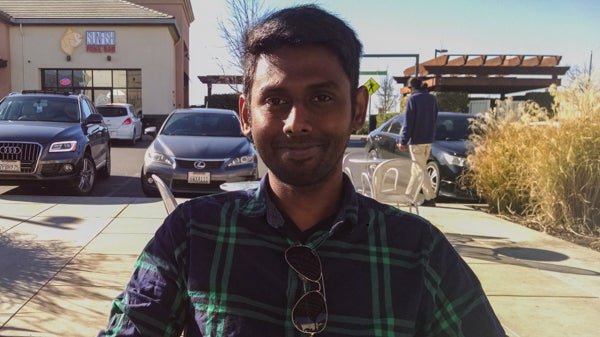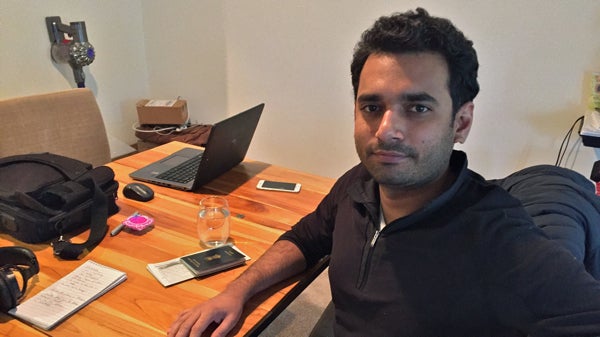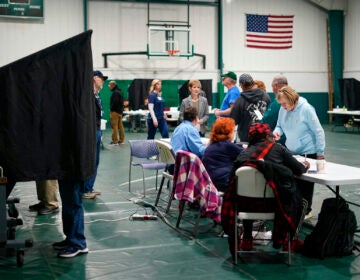Leaked Trump executive order sparks anxiety around H-1B visas popular in N.J., Pa.
Listen
Meng Li, a professor of business science at Rutgers Camden, is an H-1B visa holder. (Emma Lee/WHYY)
Meng Li grew up outside Beijing, China. He came to the U.S. on a student visa, earned a Ph.D. in Texas, and now works as a business professor at Rutgers-Camden.
Li is one of a half million specialized foreign workers toiling at companies and universities across the country on H-1B visas.
And he does not know what President Donald Trump will do to the work visa program that allowed Li to build a life in America.
“There is uncertainty,” said Li. “It could be good. It could be bad.”
A draft executive order leaked last month calls for a wholesale review of all U.S. worker visa programs, specifically the popular “specialty worker” H-1B program.
If Trump decides to scale back or scrap the program, it could have major ramifications in New Jersey and Pennsylvania, where about 10 percent of all H-1B visa holders likely work, according to federal data.
Trump, the former businessman who employed H-1B workers, has not addressed the draft executive order let alone signed it.
And unlike Trump’s travel ban regarding refugees and people coming from seven Muslim-majority countries, altering the H-1B program would entail changes to federal regulations, which requires a lengthy notice and comment period.
But anxiety is growing among foreign workers nonetheless.
“Whenever there’s a [proposed] law change, there’s a flux,” said Shereen Chen, a South Jersey-based immigration attorney, whose clients have been calling her with worried questions since the executive order leaked.
Chen said there’s an uneasy feeling in the air, which she explained with a Star Wars analogy.
“It’s almost like there’s a flux in the Force.”
What is the H-1B?
The H-1B temporary worker visa was created for jobs in “specialty occupations” so that employers unable to find qualified American workers could hire skilled foreign nationals. Up to 85,000 visas are issued each year.
It is often referred to has a “high-tech” visa because many of the jobs that qualify are in STEM fields, such as computer programming and software development, but the minimum qualification is a bachelor’s degree.
(Fashion models “of distinguished merit and ability” also have qualified for H-1Bs.)
Federal data shows that employers in New Jersey and Pennsylvania likely account for about 10 percent of all H-1B “specialty worker” visas nationwide.
 New Jersey and Pennsylvania likely account for about ten percent of all H-1B specialty foreign workers nationwide, according to federal data. (Joe Hernandez/WHYY)
New Jersey and Pennsylvania likely account for about ten percent of all H-1B specialty foreign workers nationwide, according to federal data. (Joe Hernandez/WHYY)
A spokesman for the State Department, which issues H-1B visas, said the agency does not track the job location of these visas.
But data from other relevant federal agencies paints a picture of the specialty worker population in the Garden and Keystone States.
According to the Department of Homeland Security, nine percent of border crossings by H-1B visa holders were made by workers in New Jersey and Pennsylvania.
Eleven percent of the H-1B applications certified by the Department of Labor this year were for jobs in New Jersey and Pennsylvania, highlighting a high need for these workers in the region.
It means that whatever Trump has in store for the H-1B program could seriously impact this region.
The problem is figuring out where Trump stands on the controversial work visa program: he espoused several conflicting positions on the H-1B visa during his campaign.
At times he backed the program. Other times, not so much. “It’s very bad for our workers. And it’s unfair for our workers. And we should end it,” Trump said during the CNN Republican presidential primary debate in March.
Trump has acknowledged that he has hired H-1B workers in the past for his real estate businesses. In fact, a fashion model hired by the Trump organization is suing her former employer, claiming that she was promised pay that never materialized and that the company lied on her visa application.
Other members of the Trump administration have openly criticized the program too, including chief strategist Steve Bannon and Attorney General Jeff Sessions.
Ongoing debate
Supporters and opponents agree that there is some abuse in the H-1B program.
Companies have been caught paying their foreign workers less than their American employees, which is illegal.
The program is also notorious for the large Indian outsourcing firms that submit thousands of H-1B applications each year for a limited number of visas, which are awarded in a random lottery for those that submit qualifying applications.
But Philadelphia immigration attorney Jonathan Grode contends that most companies that hire specialized foreign workers are not trying to game the system.
“They’re doing it because they think this is the best person to help advance their company. They’re doing this because they say ‘we can’t find anybody else,” said Grode, adding that the process to hire foreign workers is both lengthy and expensive.
Grode said that if the H-1B program were used properly, it becomes a job creator for American workers.
“A lot of the top companies in this country were founded by foreign nationals, and a lot of those foreign nationals came off the H-1B program,” he said.
 H-1b visa holder Seshank Vemuri says the program “needs a kick in the butt,” but he is curious what kind of reforms the Trump administration is planning. (Joe Hernandez/WHYY)
H-1b visa holder Seshank Vemuri says the program “needs a kick in the butt,” but he is curious what kind of reforms the Trump administration is planning. (Joe Hernandez/WHYY)
Even some foreign workers on H-1B visas think the program could be improved.
Indian native Seshank Vemuri, a business software consultant in suburban Philadelphia, has had an H-1B visa for eight years. Vemuri’s employer sponsored his green card application five years ago, but he does not expect to get it anytime soon thanks to a lengthy backlog of applications.
He said the main problem with the H-1B program is the lack of mobility among workers: if Vemuri changed jobs, his new employer would have to be willing to sponsor him and submit an application for a green card, which allows permanent residency.
“I am all for reforming the H-1B system,” said Vemuri. “It’s just an archaic system that is stuck in the 1980s and needs a kick in the butt.”
He does not think Trump will scrap the program entirely. But Vemuri wonders exactly how the reforms — which change depending on whom you ask — will shape up.
“I’d be interested to know what kind of reform they’re pursuing,” he said. “At this point, based on what I’ve seen, it’s all speculative as to what is going to come down the pike.”
WHYY is your source for fact-based, in-depth journalism and information. As a nonprofit organization, we rely on financial support from readers like you. Please give today.




